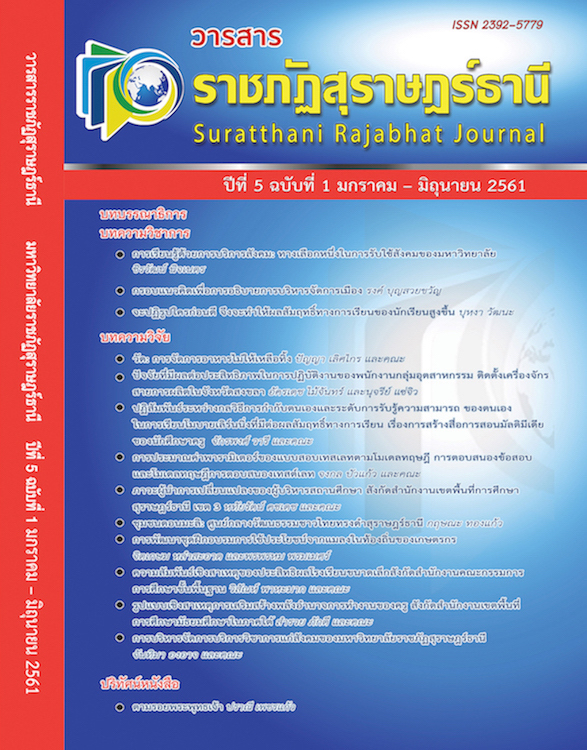A Causal Model of Teachers’ Empowerment Under the Secondary Educational Service Area Office In Upper Southern Area, Thailand
Main Article Content
Abstract
This study aimed to develop the causal model of teachers’ empowerment and verify the consistency of causal model of teachers’ empowerment which developed with empirical data. The research was conducted in two phases. Firstly, the causal model of teachers’ empowerment was built by having an in-depth interview with 7 educational supervisors. The instrument was a semi-structured interview and data analysis by content analysis. Secondly, the consistency of causal model of teachers’ empowerment with empirical data was verified. A random sample of 400 teachers in public schools under the Secondary Educational Service Area Office in Upper Southern Area in the academic year 2016 was chosen. Questionnaires with the reliability between 0.805-0.870 were given to collect data. The methods of data analysis were percentage, mean, standard deviation, and path analysis with applied programs.
The results of this study showed that, firstly, the causal model of teacher empowerment was developed by the researcher. Participatory management had a direct influence on teacher empowerment, followed by goal setting. The reinforcing factors and goal setting indirectly influenced the empowerment of teachers. When analyzing the data, it was found that the causal variables of the correlations of the study could explain the variance to the empowerment of teachers at a high level. This showed the factors that led to the development of the relationship model in this study had a great influence on the empowerment of teachers. Secondly, the causal model developed by the researcher was consistent with the empirical data. In addition, the effect of job performance and satisfaction of teachers in schools was also high. This demonstrates the reliability of the causal model and can be used to further develop and empower teachers.
Article Details
References
ณฐกร รักษ์ธรรม นิคม จารุมณี และผ่องศรี วาณิชย์ศุภวงศ์. (2557). ปัจจัยเชิงสาเหตุ ที่มีอิทธิพลต่อการเสริมสร้างพลังอำนาจ การทำงานของครูในสถานศึกษา สังกัดสำนักงานเขตพื้นที่การศึกษาประถมศึกษาในภาคใต้. วารสารราชภัฏ สุราษฎร์ธานี. Vol 1, No 1.
ประทีป จินงี่. (2551). การเสริมแรงทางบวก (Positive reinforcement). เอกสารประกอบ การฝึกอบรมเชิงปฏิบัติการ. กรุงเทพฯ : สถาบันวิจัยพฤติกรรมศาสตร์ มหาวิทยาลัย ศรีนครินทรวิโรฒ.
พัชรี บุญนาคแย้ม ปรีชา อ่วมปัญญา และธีระ ภักดี. (2557). แนวทางพัฒนาการเสริมสร้างพลังอำนาจการทำงานของครูในสถานศึกษา สังกัดสำนักงานเขตพื้นที่การศึกษาตาก เขต 2. วารสารมนุษยศาสตร์และสังคมศาสตร์ มหาวิทยาลัยราชภัฏกำแพงเพชร. Vol 15, No 1
พิมรา กฤษณะบาล. (2550). คำชมของหัวหน้างานกับขวัญในการปฏิบัติงานของ พนักงาน : การศึกษาเฉพาะ กรณีพนักงานของบริษัท อยุธยา อัลลิอันซ์ ซี.พี. ประกันชีวิต จำกัด (มหาชน). การศึกษาตามหลักสูตรศิลปศาสตรมหาบัณฑิต สถาบันเทคโนโลยีพระจอมเกล้าพระนครเหนือ.
ภารดี อนันต์นาวี. (2551). หลักการ แนวคิด ทฤษฎีทางการบริหารการศึกษา. ชลบุรี : มนตรี. มิเกล กาไรซาบาล.
ยุกตนันต์ หวานฉ่ำ. (2555). การบริหารสถานศึกษากับประสิทธิผลของโรงเรียนในอำเภอ คลองหลวง สังกัดสำนักงานเขตพื้นที่การศึกษาประถมศึกษาปทุมธานี เขต 1. วิทยานิพนธ์ศึกษาศาสตรมหาบัณฑิต สาขาวิชาเทคโนโลยีการบริหารการศึกษา มหาวิทยาลัยราชมงคงธัญบุรี.
วิภาวรรณ วงษ์สุวรรณ์คงเผ่า. (2556). การพัฒนาแนวทางการตรวจงานการให้ข้อมูลย้อนกลับและผลของการให้ข้อมูลย้อนกลับงานเขียนของนิสิตระดับปริญญาบัณฑิตชั้นปีที่ 1. วารสารครุศาสตร์. 41 (1), 180-194.
วีรยุทธ แสงสิริวัฒน์. (2550). การบริหารแบบมีส่วนร่วมของผู้บริหารที่ส่งผลต่อ ประสิทธิผล ของศูนย์การศึกษานอกโรงเรียนจังหวัด. กรุงเทพฯ : มหาวิทยาลัย ศิลปากร.
ศิริชัย กาญจนวาสี. (2552). ทฤษฎีการทดสอบแบบดั้งเดิม (พิมพ์ครั้งที่ 6). กรุงเทพฯ: จุฬาลงกรณ์มหาวิทยาลัย.
สัมฤทธิ์ กางเพ็ง. (2551). ปัจจัยการบริหารที่มีอิทธิพลต่อประสิทธิผลของโรงเรียน : การพัฒนาและตรวจสอบความเที่ยงตรงของตัวแบบ. วิทยานิพนธ์ปริญญา ศึกษาศาสตร์ดุษฎีบัณฑิต สาขาวิชาการบริหารการศึกษา บัณฑิตวิทยาลัย มหาวิทยาลัยขอนแก่น.
สุดารัตน์ วัฒนพฤกษา. (2552). การศึกษาการเสริมสร้างพลังอำนาจครูในโรงเรียนเอกชน. วิทยานิพนธ์ปริญญาดุษฎีบัณฑิต สาขาวิชาบริหารการศึกษา บัณฑิตวิทยาลัย มหาวิทยาลัยเกษตรศาสตร์.
สุพานี สฤษฎ์วานิช. (2552). พฤติกรรมองค์การสมัยใหม่ : แนวคิดและทฤษฎี (พิมพ์ครั้งที่ 2). กรุงเทพฯ : มหาวิทยาลัยธรรมศาสตร์.
สุเทพ พงศ์ศรีวัฒน์. (2550). ภาวะความเป็นผู้นำ. กรุงเทพฯ : ส.เอเชียเพรส (1989).
สมจิต สงสาร. (2552). การพัฒนาตัวแบบความสัมพันธ์โครงสร้างเชิงเส้นของปัจจัย ที่มีอิทธิพลต่อการเสริมสร้างพลังอำนาจการทำงานที่มีประสิทธิผลของครู.วิทยานิพนธ์ศึกษาศาสตรดุษฎีบัณฑิต สาขาการบริหารการศึกษา บัณฑิตวิทยาลัย มหาวิทยาลัยขอนแก่น.
สมชาย บุญศิริเภสัช. (2545). การศึกษาการเสริมสร้างพลังอำนาจการทำงานของครู ในโรงเรียนมัธยมศึกษา เขตการศึกษา 8. วิทยานิพนธ์ปรัชญาดุษฎีบัณฑิต สาขาการบริหารการศึกษา บัณฑิตวิทยาลัย มหาวิทยาลัยศรีนครินทรวิโรฒ.
อารีย์วรรณ อ่วมตานี. (2549). การวิจัยเชิงคุณภาพทางการพยาบาล. กรุงเทพฯ: โรงพิมพ์แห่งจุฬาลงกรณ์มหาวิทยาลัย.
อุษณีย์ จำเมือง. (2553). ปัจจัยเชิงสาเหตุของภาวะผู้นำที่ส่งผลต่อประสิทธิผลของโรงเรียน สังกัดสำนักงานคณะกรรมการการศึกษาขั้นพื้นฐาน. วิทยานิพนธ์ปรัชญา ดุษฎีบัณฑิต สาขาการบริหารการศึกษา บัณฑิตวิทยาลัย มหาวิทยาลัยสยาม.
Bill, L. (2004). 10 Strategies for Staff Empowerment. Principal Leadership. Vol.4. No.6.
Bogler, R. and Somech, A. (2004). Influence of Teacher Empowerment on Teachers’ Organizational Commitment, Professional Commitment and Organization. Citizenship Behavior in School. Science Direct - Teaching and Teacher Education.
Cronbach, L. J. (1990). Essentials of psychological testing (5th ed.). New York : Harper Collins Publishers.
Del Chiaro, S.A. (2006). The Effect of Training Supervisors to Use Positive Verbal Reinforcement on Employee Job Satisfaction. Ph.D.Thesis, Faculty of the School of Education, University of San Francisco.
Ekaningsih, A.S. (2014). The Effect of Transformational Leadership on the Employees' Performance through Intervening Variables of Empowerment, Trust, and Satisfaction : A Study on Coal Companies in East Kalimantan. European Journal of Business and Management. Vol.6. No.22.
Hoy, W.K, and Miskel, C.G. (2005). Educational Administration : Theory. Research and Practice (7th ed.). New York : McGraw-Hill.
Kanter, R.M. (1979). Power failure in management circuits. Harvard Business Review. Vol. 57 No. 4.
Noe, R.A., LePine, J.A., and Colquitt, J.A. (2000). Toward an integrative theory of training motivation: A meta-analytic path analysis of 20 years of research. Journal of Applied Psychology. Vol.85. No.5.
Ozaralli, N. (2003). Effects of transformational leadership on empowerment and team effectiveness. Leadership and Organization Development Journal. Vol.24.No.6.
Spreizer, G.M., Kizilos, M.A., and Nason, S.W. (1995). A Dimentional Analysis of the Relationship between Psychological Empowerment and Effectiveness, Satisfaction, and Strain. Journal Management. Vol.23, No.5.
Stephen, K. (2002). Social capital, growth, and poverty : A Survey of crosscountry evidence. In The role of social capital in development : An empirical assessment, edited by Cristiaan Grootaert and Thierry van Bastelaer. New York : Cambridge University Press.
Stringer, R. A. (2002). Leadership and organizational climate. Upper Saddle River : Prentice Hall.
Yamane, T. (1973).Statistics: An Introductory Analysis (3rd ed.) New York : Harper and Row Publications.
Taylor, R.B., Brown, B.B, and Perkins, D.D. (1996). The Ecology of Empowerment : Predicting Participation in Community Organizations. Journal of Social Issues. Volume.52. No.1.


